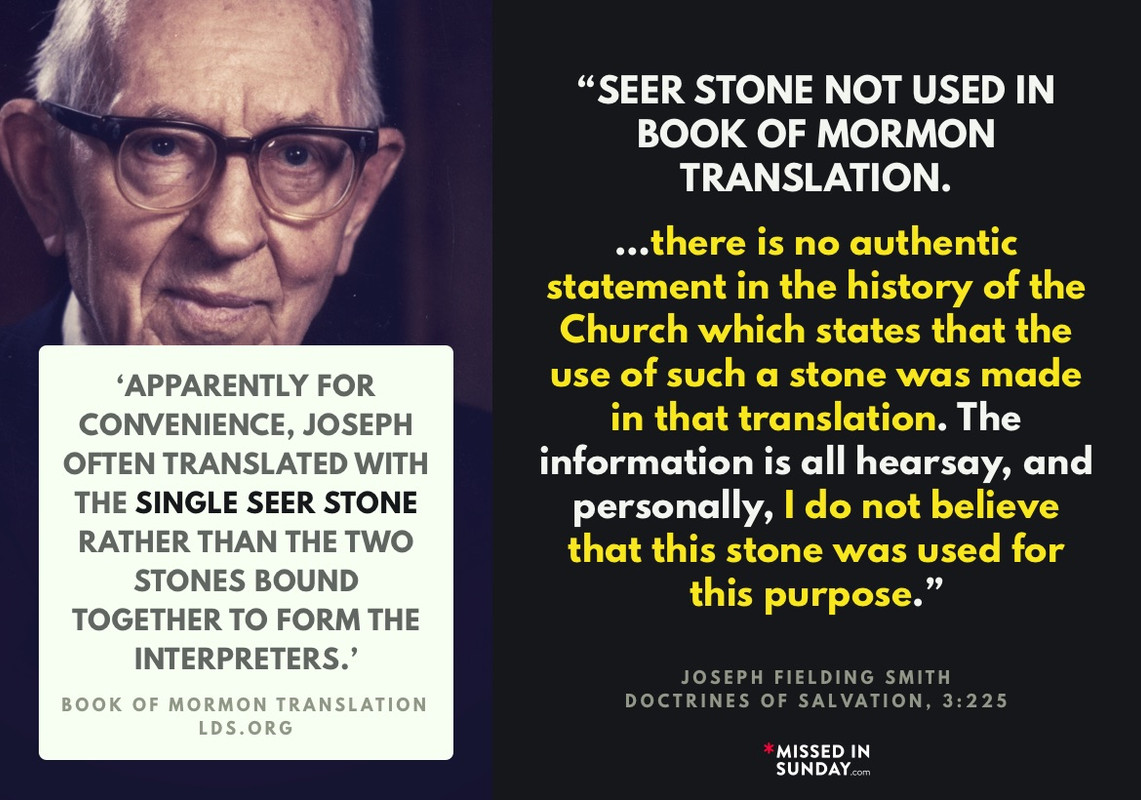Jonathan Neville shills for anti-Mormons (again)
|
Tags: Church leadership, Church website, Gospel Topics Essays, Joseph Fielding Smith, Logical fallacies, Prophetic infallibility, Seer stones
“Stuff You Missed in Sunday School” is an online meme page that tries to point out supposed contradictions in Latter-day Saint beliefs. I’m not going to provide them a link—you can look them up online yourself, if you’re so inclined—but their content lacks even a modest level of depth or understanding. Their modus operandi is to take advantage of the low level of knowledge many Saints have about difficult or complex issues involving Church history and doctrine.
Considering his willingness to freely use and even defend anti-Mormon resources, it’s not at all surprising that Jonathan Neville posted this “Stuff You Missed in Sunday School” meme to his “Book of Mormon Central America” blog on November 29, 2022: Neville followed up with this statement:
In his comments, Neville has employed the logical fallacy of appeal to authority: Insisting that a claim must be true simply because someone important said it was true, without any other supporting evidence offered. In this case, he has appealed to Joseph Fielding Smith, who “personally [did] not believe” that Joseph Smith used a seer stone to translate the Book of Mormon. Neville argues, fallaciously, that Joseph Fielding Smith’s view is correct because he was an apostle and served as Church historian; serving in those two positions does not make him infallible, however, and Neville himself would certainly disagree with some of the views he held.
In summary, “Stuff You Missed in Sunday School” has tried to pit the current official stance of the Church concerning a historical matter against the personal stance of a prophet who has been dead for over fifty years. Joseph Fielding Smith wasn’t correct in the first place, so his personal views are inconsequential. What’s worse, though, is that Jonathan Neville has decided, once again, to use the “any stick with which to beat them” approach to dealing with those who disagree with him, to the point of being willing to repost anti-Mormon claims that are designed to destroy the testimonies of the spiritually weak and historically unaware.
Neville should be ashamed of his actions, but my guess is that he’s not.
—Peter Pan
Considering his willingness to freely use and even defend anti-Mormon resources, it’s not at all surprising that Jonathan Neville posted this “Stuff You Missed in Sunday School” meme to his “Book of Mormon Central America” blog on November 29, 2022: Neville followed up with this statement:
One quotation is from an anonymous essay written by scholars who promoted their own theories and never bothered to quote what Joseph Smith and Oliver Cowdery said on the topic.The meme and Neville’s commentary overlook the long and complex history of how Latter-day Saint historians have treated the many eyewitness accounts of Joseph Smith using a seer stone to translate the Book of Mormon and receive revelations. Many historians have accepted these accounts, and their eyewitness testimonies have been printed in Church-published books and newspapers in the 19th, 20th, and 21st centuries. A very small number of historians have rejected these eyewitness testimonies, Joseph Fielding Smith being the most prominent example.
The other is from a President of the Church who served as an apostle for 62 years and 2 months, second only to David O. McKay (63 years and 9 months). He also served as Church historian for nearly 50 years.
In his comments, Neville has employed the logical fallacy of appeal to authority: Insisting that a claim must be true simply because someone important said it was true, without any other supporting evidence offered. In this case, he has appealed to Joseph Fielding Smith, who “personally [did] not believe” that Joseph Smith used a seer stone to translate the Book of Mormon. Neville argues, fallaciously, that Joseph Fielding Smith’s view is correct because he was an apostle and served as Church historian; serving in those two positions does not make him infallible, however, and Neville himself would certainly disagree with some of the views he held.
In summary, “Stuff You Missed in Sunday School” has tried to pit the current official stance of the Church concerning a historical matter against the personal stance of a prophet who has been dead for over fifty years. Joseph Fielding Smith wasn’t correct in the first place, so his personal views are inconsequential. What’s worse, though, is that Jonathan Neville has decided, once again, to use the “any stick with which to beat them” approach to dealing with those who disagree with him, to the point of being willing to repost anti-Mormon claims that are designed to destroy the testimonies of the spiritually weak and historically unaware.
Neville should be ashamed of his actions, but my guess is that he’s not.
—Peter Pan






I came across an article yesterday that touches on the low level of information many Church members have [been satisfied with], and which is so easily exploited. In 1979, Bruce Hafen, then President of Ricks College, presented remarks, later published in the Ensign in August of that year, entitled "On Dealing with Uncertainty." He calls out a superficial optimism that can see no wrong, and a superficial pessimism that sees all wrong.
ReplyDeleteThen he offers a third way, via GK Chesterton who "...observed that neither the extreme optimist nor the extreme pessimist would ever be of much help in improving the human condition, because people can’t solve problems unless they are willing to acknowledge that a problem exists and yet also retain enough genuine loyalty to do something about it."
Definitely worth the read.
Great resource, Eric! Here’s a link to the article you suggested:
Deletehttps://www.churchofjesuschrist.org/study/ensign/1979/08/on-dealing-with-uncertainty
If I'm being honest, I saw myself in all three approaches Hafen described. Not always in a good way. Something to work on...
Delete